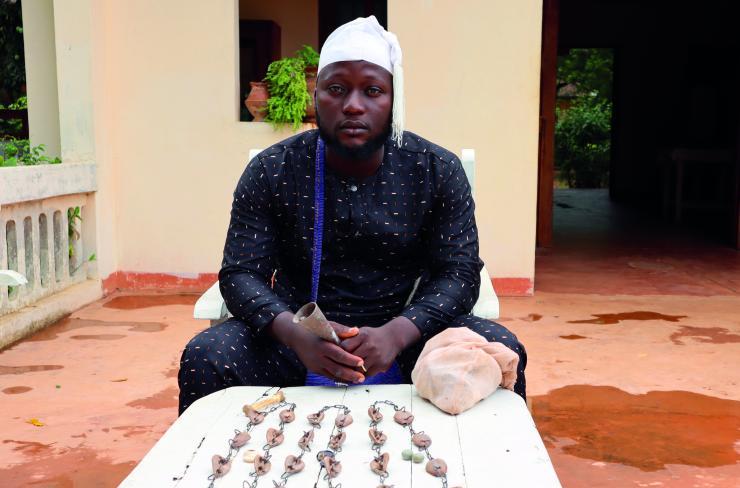“Fa is the truth that arose at the origins of history. It was given to us by our ancestors. It must always be consulted before any action. It is the past, the present and the future”
Fagla Bagbonon speaks with poise and seriousness. Not a grimace crosses his face as he produces three sets of large cowries on chains from his white bag. Then some chicken bones appear. Finally, a bell. These are his working tools. He throws the cowries on a clean sand surface after invoking the ancestors and spirits to the rhythm of the bell. Once the spells are finished, he picks up the chains.
He then takes a chicken bone and with it points to the marks imprinted on the ground. In this way, he interprets the message that the oracle transmits. His neighbours call him whenever they want to undertake something, guess the meaning of a dream or find out what the future holds for them. The Boconon, or priest, which is the title of the Bagbonon, conveys the message of the ancestors. He then recommends what sacrifice the ancestors ask for so that everything goes as planned. It can be a chicken, a lamb or a cow. It is usually accompanied by palm oil, flour and liquor.
Not everyone can be a Boconon. One has to be born into a family of priests and learn the trade from one’s father or grandfather. It will then be the ancestors, through the ago, who will decide who will succeed the Boconon upon his death. It’s not enough to practice from a young age, one has to be chosen as Bagbonon was. Neither his father, nor his uncles, nor his brothers or cousins were chosen. He took his grandfather’s place. It was decided by the Fa. His family has always been in the service of the kings of Abomey (Benin).
But he also helps his neighbours when the current monarch, Dêwênondé Gbêhanzin, does not need his services. Bagbonon is annoyed that some Boconons opened schools earlier.
“It is a money-making activity that goes against our laws and the guidelines given by our ancestors,” he explains. In these institutions, anyone can learn the secrets of the profession, even if he does not come from a priestly family. “It is a trivialization of our traditions. In this world where many no longer believe in the gods of voodoo or the power of spirits and ancestors, everything is commercialized. It is people without faith who do these things,” he says with a tone of voice that seems angry, but without expressing any emotion on his face.
“Then these apprentices, who were not appointed by the ancestors, undertake to deceive people, asking them for money to recommend sacrifices that they invent. They never satisfy the spirits or the gods.” Bagbonon takes his priesthood very seriously. He never charges for his services. He only accepts donations given voluntarily. He lives off the produce of his fields. (Text and Photo: Chema Caballero)






